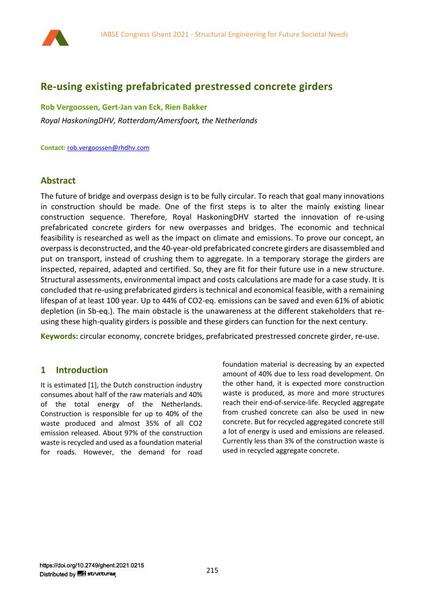Re-using existing prefabricated prestressed concrete girders

|
|
|||||||||||
Bibliografische Angaben
| Autor(en): |
Rob Vergoossen
(Royal HaskoningDHV, Rotterdam/Amersfoort, the Netherlands)
Gert-Jan van Eck (Royal HaskoningDHV, Rotterdam/Amersfoort, the Netherlands) Rien Bakker (Royal HaskoningDHV, Rotterdam/Amersfoort, the Netherlands) |
||||
|---|---|---|---|---|---|
| Medium: | Tagungsbeitrag | ||||
| Sprache(n): | Englisch | ||||
| Tagung: | IABSE Congress: Structural Engineering for Future Societal Needs, Ghent, Belgium, 22-24 September 2021 | ||||
| Veröffentlicht in: | IABSE Congress Ghent 2021 | ||||
|
|||||
| Seite(n): | 215-222 | ||||
| Anzahl der Seiten (im PDF): | 8 | ||||
| DOI: | 10.2749/ghent.2021.0215 | ||||
| Abstrakt: |
The future of bridge and overpass design is to be fully circular. To reach that goal many innovations in construction should be made. One of the first steps is to alter the mainly existing linear construction sequence. Therefore, Royal HaskoningDHV started the innovation of re-using prefabricated concrete girders for new overpasses and bridges. The economic and technical feasibility is researched as well as the impact on climate and emissions. To prove our concept, an overpass is deconstructed, and the 40-year-old prefabricated concrete girders are disassembled and put on transport, instead of crushing them to aggregate. In a temporary storage the girders are inspected, repaired, adapted and certified. So, they are fit for their future use in a new structure. Structural assessments, environmental impact and costs calculations are made for a case study. It is concluded that re-using prefabricated girders is technical and economical feasible, with a remaining lifespan of at least 100 year. Up to 44% of CO₂-eq. emissions can be saved and even 61% of abiotic depletion (in Sb-eq.). The main obstacle is the unawareness at the different stakeholders that re- using these high-quality girders is possible and these girders can function for the next century. |
||||
| Stichwörter: |
Betonbrücke Verwertung
|
||||
| Copyright: | © 2021 International Association for Bridge and Structural Engineering (IABSE) | ||||
| Lizenz: | Die Urheberrechte (Copyright) für dieses Werk sind rechtlich geschützt. Es darf nicht ohne die Zustimmung des Autors/der Autorin oder Rechteinhabers/-in weiter benutzt werden. |
||||
